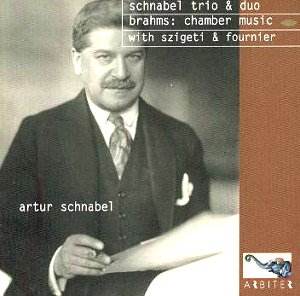Schnabel’s period of post-War European music-making
was brief. In 1947 he organised a flexible ensemble with which to tour
– Joseph Szigeti, Pierre Fournier, William Primrose, the violinist and
quartet leader Ernest Element and bassist James Merrett. Fortunately
enthusiasts managed to record some of the repertoire and it makes its
first appearance here – from the Edinburgh recital of 30th
August and the London ones of 22nd and 26th September.
The circumstances of the private recordings were such that the sound
is frequently poor – there’s no getting around this fact; acetate scuffs,
waver, distortion, some constant acetate swishes in the opening movement
of the Sonata in G, the fact that inevitably some acetate joins are
less than perfect, splashy sound and some fragmentation. Those for whom
this sort of thing is anathema should back out now. But for everyone
else there are strong reasons for perseverance – and you will be rewarded
with frequently magnetic performances and in the case of the trio in
particular, a synthesis of musical minds, personalities and aesthetic
priorities which produces a reading of astonishing tension.
The Trio in B features Schnabel rather backward in
the balance but we can still appreciate his marshalling intelligence
and the seemingly infinite layers and shades of colour he can impart.
In the Scherzo he is astonishing in his tonal reduction and at pointing
the rhythm, which he does with absolute surety. The string players make
a fruitful contrast, Szigeti a little wiry by now, Fournier nobility
itself – the study and contrasts in bowing is in itself fascinating
even though the violinist does come under a little pressure here. The
movement ends in a movingly elfin benediction, creating entirely the
most apt introduction to the ten and a half minute but perfectly sustained
Adagio. All three musicians spin the most moving and expressive line
here, long breathed and infallibly textured – passing frailties are
of little account as one listens to Schnabel’s weight and seriousness,
Szigeti’s plangent portamenti and Fournier’s tonal allure. The finale
is fine, dramatic and strongly etched and concludes a performance of
all-embracing wisdom.
As I said there is some extensive acetate damage in
the opening of the Op 78 Violin Sonata but we can still manage to listen
through it – the attempt is worthwhile believe me – to the flexible
lyricism imparted by Szigeti and Schnabel. Especially admirable is the
way the violinist coils and colours his tone in the Adagio. Both men
follow the molto moderato instruction of the Allegro finale to
the letter; most instructive to hear the regality and tonal depth of
Schnabel’s Brahms playing juxtaposed with Szigeti’s portamento rich,
tonally rather shriller aesthetic. Their playing is full of clarity
and direction and the occasional split note and coarsening tone from
Szigeti one of those heat of the moment things. It’s a pity that the
private recordist had to change acetates so late in the movement – at
6.15 to be accurate – but Arbiter have here – and elsewhere – managed
these things as well as one could reasonably expect. No one can complain.
Op 100 has its fair share of splintery and scuffed sound as well as
a bit of waver but is in superior sound to the earlier sonata. This
is a splendid performance as well – verdant and fresh, wise and alive,
with the beautiful repose of the Andante tranquillo explored with affectionate
animation. Occasionally the recording will emphasise a clanging from
the piano – especially in the final movement - but this won’t spoil
ones pleasure of this generous reading.
Further it should be noted that Szigeti’s commercial
recordings of the first two Brahms sonatas are hard to come across –
he recorded them with Horszowski; Op 78 in April 1951 for Columbia and
Op 100 in March 1959 for Mercury by which time he was well into decline
and near the end of his career. Another live performance of Op 100 with
Schnabel has circulated - from the Frick Museum in April 1948. But these
live recital performances in London in 1947 are must-haves despite the
attendant aural distractions. For the nobility and beauty of the Trio
one should drop everything.
Jonathan Woolf

![]() Artur Schnabel (piano)
Artur Schnabel (piano)
![]() ARBITER 121 [78.03]
ARBITER 121 [78.03]